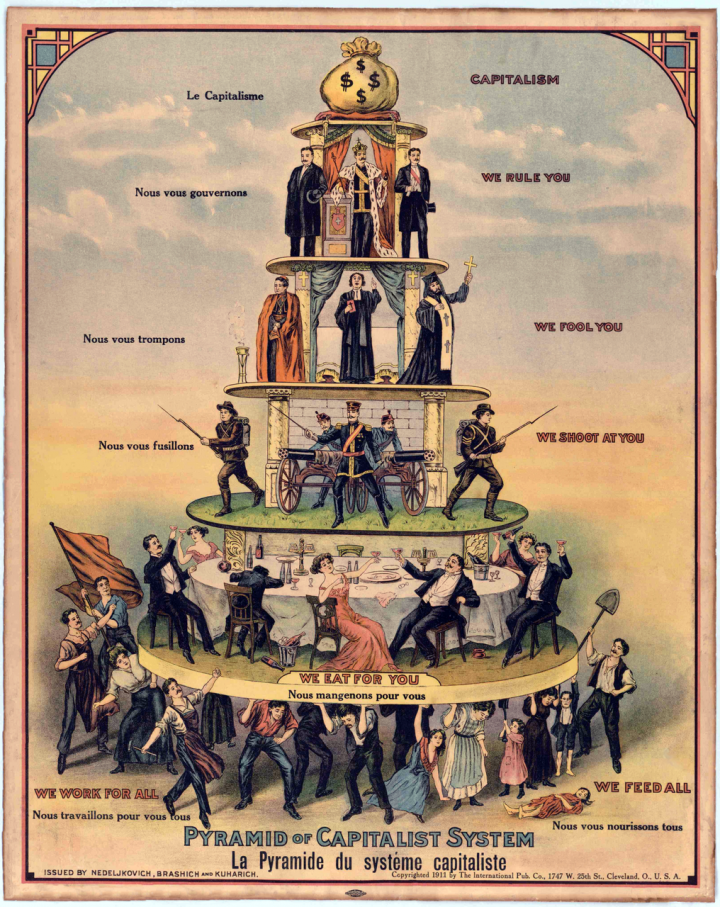“Capitalism’s near-death experience with the banking crisis was a golden opportunity for progressives. But they blew it.
“…preparations are well under way for protests to mark next month’s 10th anniversary of the collapse of Lehman Brothers – the pivotal moment in the global financial crisis.
“Make no mistake, the fact that events will take place in all the world’s financial centres is no cause for celebration. On the contrary, it is a sign of failure. The banks were never broken up. Plans for a financial transactions tax are gathering dust. Politicians toyed with the idea of a green new deal and then promptly forgot about it. There never was a huge swing of the pendulum away from the prevailing orthodoxy, just a brief nudge that was quickly reversed. The brutal fact is that the left had its chance, and it blew it.
“Ten years on, international finance is as powerful as it ever was. There has been only cosmetic reform of the banking industry. Corporate power is ever more concentrated. The benefits of the weakest global recovery from recession in living memory have been captured by a tiny minority. Wages and living standards for the majority in developed countries have grown only modestly, if at all”. Larry Elliot for The Guardian
I think this piece summarises perfectly well what went wrong after the 2007-8 crash. It was a window of opportunity to effect real change in the economic system, but those in power chose to close the shutters and stay in their (rapidly collapsing) comfort zone, still believing that the system could be saved by a few little tweaks (e.g., Uk £85o+bn , US $12.5+tn bailouts, other countries followed suit).

Girl pulling a coal tub in mine, from official report of the British parliamentary commission in the mid 19th century
But instead of the intended support for the “real”economy (mortgages, loans for small and medium businesses and cooperatives, investment in services) the international financial system diverted the bailouts to speculation and bonuses, that is, business as usual. Not surprisingly, on approaching September 15th, 10th anniversary of the collapse of the iconic Lehman Bros, millions of people are warning that a new collapse may be just round the corner. In fact it is already happening, but in slow motion. The unknown quantities are of course the Trumpian Trade Wars, China’s preparations for the eventual crisis and Brexit. It could be the case that some countries have wised up a bit and are trying to avoid the packs of rubbish shares (like the subprime mortgages identified as the trigger of the crisis) which are no doubt circulating again. And some countries have managed to change the model to largely emerge from the system, like Bolivia with Evo Morales, but the media tends to keep very quiet about this.
Spookily, in 2001 Argentina had it own dress rehearsal of things to come with a complete implosion of its economy (thanks to the handy work of the IMF and the Credit Rating Agencies like Standard and Poor, Moody, etc., (1) demanding the neoliberal model be implemented to its last consequences, same as the present Macri government and its US handlers), which was to be followed 6 years later by the global collapse. Well, Argentina is imploding again, if this is not a clarion warning to the world I don’t know what it is.
The voices of sanity
Thankfully TINA (Margaret Thatcher’s “There is no alternative” – to neoliberalism) is dead. Well regarded economists like Nobel laureate Joseph Stiglitz and Thomas Piketty have been warning that neoliberal-driven inequality is the biggest threat to the future of humanity. Individuals and movements for change are appearing in many countries around the world, Jeremy Corbyn in the UK, Bernie Sanders in the US, Jean-Luc Mèlenchon in France, Podemos in Spain, DiEM25 in Europe, and many others are making the right proposals, already outlined by Silo in 1992:
“For humanists, labor and capital are the principal factors in economic production, while speculation and usury are extraneous. In the present economic circumstances, humanists struggle to totally transform the absurd relationship that has existed between these factors. Until now we have been told that capital receives the profits while workers receive wages, an inequity that has always been justified by the “risk” that capital assumes in investing—as though working people do not risk both their present and their future amid the uncertainties of unemployment and economic crisis.
“Another factor in play is management and decision-making in the operation of each company. Earnings not set aside for reinvestment in the enterprise, not used for iexpansion or diversification, are increasingly diverted into financial speculation, as are iprofits not used to create new sources of work.
“The struggle of working people must therefore be to require maximum productive return from capital. But this cannot happen unless management and directorships are cooperatively shared. How else will it be possible to avoid massive layoffs, business closures, and even the loss of entire industries? For the greatest harm comes from under-investment, fraudulent bankruptcies, forced acquisition of debt, and capital flight—not from profits realized through increased productivity. And if some persist in calling for workers to take possession of the means of production following nineteenth-century teachings, they will have to seriously consider the recent failures of real socialism.
“As for the argument that treating capital the same way work is treated will only speed its flight to more advantageous areas, it must be pointed out that this cannot go on much longer because the irrationality of the present economic system is leading to saturation and crisis worldwide. Moreover, this argument, apart from embracing a radical immorality, ignores the historical process in which capital is steadily being transferred to the banking system. As a result, employers and business people are being reduced to the status of employees, stripped of decision-making power in a lengthening chain of command in which they maintain only the appearance of autonomy. And as the recession continues to deepen, these same business people will begin to consider these points more seriously.” (2)
The sane proposals include fair progressive taxation, closing the loopholes that allow tax evasion and avoidance such as Tax Havens, re-nationalisation of services and support for public health, education housing and welfare, research and investment into the “green” economy both for the sake of climate change and to prevent the millions of deaths brought about by the effect on health of air, water and land contamination, discouraging speculation through the Financial Transaction or Tobin Tax and reducing taxes to companies that reinvest profits into production, increase in corporate and decrease in personal taxation, a banking system that prioritises the business model of cooperatives and partnerships (à la John Lewis in UK – proven to be much more resilient in time of economic crisis than their classical neoliberal counterparts), implementing the Universal Basic Income and promoting research and education as an on going culture at all levels of society. Experiments in the Commons (from free software and licenses to agricultural management) have proven sharing to be much better than competing.
It is not possible to be all inclusive here about the policies that can lead to a humanised, compassionate society but needless to say that ending and preventing future wars and conflict will decrease the forced migration of people, and the respectful and humane treatment of migrants is the hallmark of a more advanced society. Reductions and diversions in military budgets could easily solve all the problems of hunger and destitution affecting huge areas of the planet, closing the vicious circle of arms that need wars to sell more arms.
Unfortunately most of the corporate media, and now a lot of social media, are in the hands of the neoliberal barons that viciously lie, smear and destroy the reputation of any politician committed to bringing about change, stoking the flames of anti immigration and racism in order to promote right wing governments to continue deepening the model they profit from. As long as we fail to become more conscious of their manipulation populations will continue to elect those who ultimately work against people’s interests. Populism on the right appeals to the biggest fears to enact the most anti-human measures. Its long history and the horrors of nazism in Europe should be a warning to remain vigilant as it raises again its ugly head.
Let us not miss this window

Ten years ago the crisis took ordinary people by surprise, unprepared, individualistically unorganised, still hypnotically driven by the propaganda of the great life we could have if only we behaved according to the dictates of political mantras, “this system may not be perfect but is the only one possible” and so on. So the “solution” to the crisis was left in the hands of those we got us into it in the first place.
It is not a matter of “blaming” the architects of the crisis because the politics of fear instituted to dominate the social base also works upon the psyche of the elites, but the paranoia of the powerful makes them infinitely more dangerous. Preventing their dehumanisation is as much our responsibility as preventing the one they manufacture. It is the only way out for humanity. Revenge is a dead end, socially and spiritually.
So: It cannot happen again. We cannot leave it to the corrupt and self-serving establishment, sleepwalking again into a repetition of past crises the system uses to continue the obscene concentration of wealth and power in fewer and fewer hands. Next time they will blame the machines for massive unemployment and the growing precariat. Nothing to do with machines! It is the intention of the (terrified and equally confused) elites, incapable of empathy and compassion, that will use them to justify massive layoffs, when the machines in reality would be a wonderful way to reduce the need for work and increase the time dedicated to finding the meaningful issues in life: Science, education, spiritual development, community, they are all potential benefits from mindless work being outsourced to machines. But the paradigm has to change and it can only happen is ordinary people become aware, organised and active.
We had recently wonderful examples of very young people taking up courageous standings against injustice in different parts of the world (3), we must learn from them! But it is also necessary to produce and tidy up existing manifestos for a better World, being prepared to campaign and vote for them even in our imperfect purely formal democracies as leaving again the way out to the crisis to the powerful would be suicidal.
1. “First, the survival of Moody’s and Standard & Poor’s (now known as S&P Global Ratings). The 2010 US Senate investigation was damning: both rating agencies, amid extensive conflicts of interests and using questionable models, gave triple A ratings to financial instruments that turned out to be houses of cards. Moreover, S&P admitted in 2015 as part of a settlement with the justice department (in which it paid $1.4bn), that its rating process was marred by irregularities.
“Yet both companies remain the de facto regulators of the global bond market — they dictate what institutional investors can and cannot buy. Worse, their opinions affect interest rates.” FT
2.Silo, Letters to my friends
3. Malala Yousafzai, the kids in American schools against the gun lobby, Ahmed Tamimi, Erin Elsson, young people fighting unsafe abortions in South America, etc.






